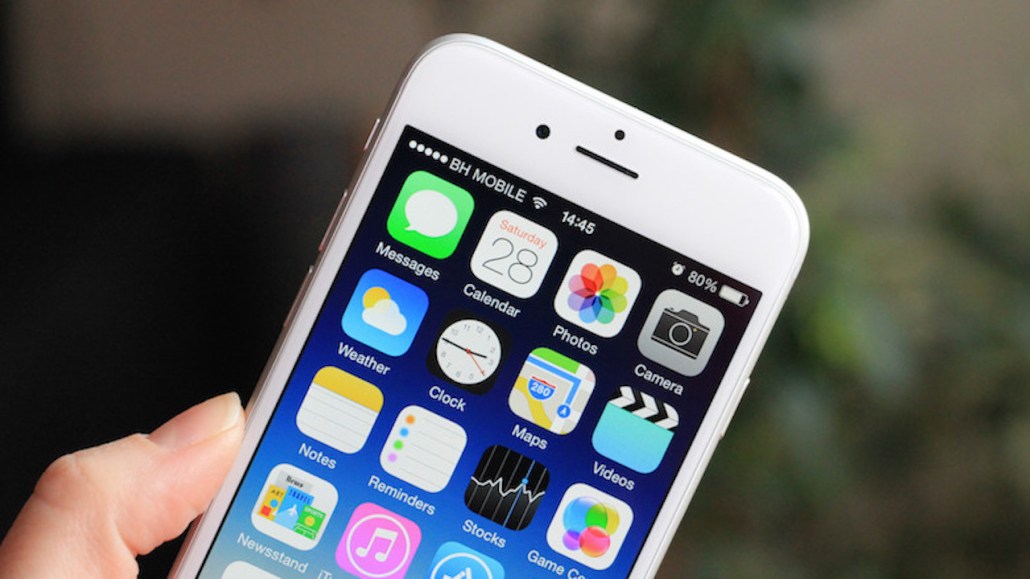Secure your place at the Digiday Media Buying Summit in Nashville, March 2-4

The amount of time people spend on their phones to use the internet is set to skyrocket this year, new research shows.
Mobile overtook desktop computers as people’s preferred device to access the internet last year, and that trend is forecast to jump by 28 percent this year, according to Zenith’s Media Consumption Forecasts, released Monday.
“Mobile internet is now growing at the expense of all other media,” said Jonathan Barnard, Zenith’s head of forecasting. “Seventy percent of internet use is now on a mobile, and the use of a desktop for internet will fall by almost 16 percent, this year.”

Television and radio are expected to see declines between 1.5 and 2.5 percent, while newspapers and magazines will be hit by falls of up to more than 6.5 percent this year. But that’s not necessarily bad news, Barnard said.
“The expansion of mobile internet consumption is an opportunity for traditional publishers and broadcasters, as much as a threat,” he said. “Traditional media has invested heavily in online brand extensions, and some of them have larger audiences online than they ever had for the offline products.”
On average, people around the world will spend 86 minutes a day using the internet on their phones, compared to 36 minutes on a desktop, this year.
However, the research paints a different picture for individual countries.
In America, for example, the development of new apps and competitive pricing options is behind the “dramatic” increase in internet use on phones, the research said.
The average American spends much longer on the internet compared to the global daily average, with each person spending two hours and 25 minutes on their phones, and 52 minutes at their desktop. By 2018, that gap is predicted to grow to people spending three hours and 20 minutes using the net on their phone, compared to just 40 minutes on the computer.

In Japan, the average time spent on phones and computers in 2016 is significantly less than in America, at 34 and 29 minutes, respectively, but the same trend is occurring, driven by young people’s use of smartphones, the research said.
Their use of messaging apps like Facebook and LINE is behind the forecast growth in mobile use, which a number of luxury and fashion brands are trying to cash in on, while a plateau of laptop and PC sales is behind the decline for computer use.

In China, the use of mobiles for internet access soared last year, with a rise of 63 percent, and the total number of mobile internet users hit 620 million people by the end of 2015.
The research pointed to the Chinese Government’s “internet plus” policy as a main factor, which encouraged more industries and companies to introduce digital tech.

In the United Kingdom this year, mobile and desktop internet is roughly equal, at one hour and 46 minutes a day, but the research suggests it’s at this point they’ll go their separate ways.
By 2018, it’s expected people will spend more than two and a half hours on their phones and an hour and 2o minutes on their computers.
The research said overall consumption of audio media is growing because of digital streaming and the availability of station aggregators like Tunein and Radioplayer, as well as radio station apps.
 These trends benefit both media creators and consumers, Jonathan Barnard said, “It provides traditional media owners the opportunity to reach people and places they’ve never had access to previously, and gives consumers entirely new ways to find and enjoy content.”
These trends benefit both media creators and consumers, Jonathan Barnard said, “It provides traditional media owners the opportunity to reach people and places they’ve never had access to previously, and gives consumers entirely new ways to find and enjoy content.”
More in Media

Digiday+ Research: Dow Jones, Business Insider and other publishers on AI-driven search
This report explores how publishers are navigating search as AI reshapes how people access information and how publishers monetize content.

In Graphic Detail: AI licensing deals, protection measures aren’t slowing web scraping
AI bots are increasingly mining publisher content, with new data showing publishers are losing the traffic battle even as demand grows.

In Graphic Detail: The scale of the challenge facing publishers, politicians eager to damage Google’s adland dominance
Last year was a blowout ad revenue year for Google, despite challenges from several quarters.





